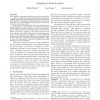Free Online Productivity Tools
i2Speak
i2Symbol
i2OCR
iTex2Img
iWeb2Print
iWeb2Shot
i2Type
iPdf2Split
iPdf2Merge
i2Bopomofo
i2Arabic
i2Style
i2Image
i2PDF
iLatex2Rtf
Sci2ools
103
click to vote
SODA
2004
ACM
2004
ACM
Frugality in path auctions
We consider the problem of picking (buying) an inexpensive s-t path in a graph where edges are owned by independent (selfish) agents, and the cost of an edge is known to its owner only. We study the problem of finding frugal mechanisms for this task, i.e. we investigate the payments the buyer must make in order to buy a path. First, we show that any mechanism with (weakly) dominant strategies (or, equivalently, any truthful mechanism) for the agents can force the buyer to make very large payments. Namely, for every such mechanism, the buyer can be forced to pay c(P)+ 1 2 n(c(Q)-c(P)), where c(P) is the cost of the shortest path, c(Q) is the cost of the second-shortest path, and n is the number of edges in P. This extends the previous work of Archer and Tardos [1], who showed a similar lower bound for a subclass of truthful mechanisms called min-function mechanisms. Our lower bounds have no such limitations on the mechanism. Motivated by this lower bound, we study mechanisms for this p...
Related Content
| Added | 31 Oct 2010 |
| Updated | 31 Oct 2010 |
| Type | Conference |
| Year | 2004 |
| Where | SODA |
| Authors | Edith Elkind, Amit Sahai, Kenneth Steiglitz |
Comments (0)

